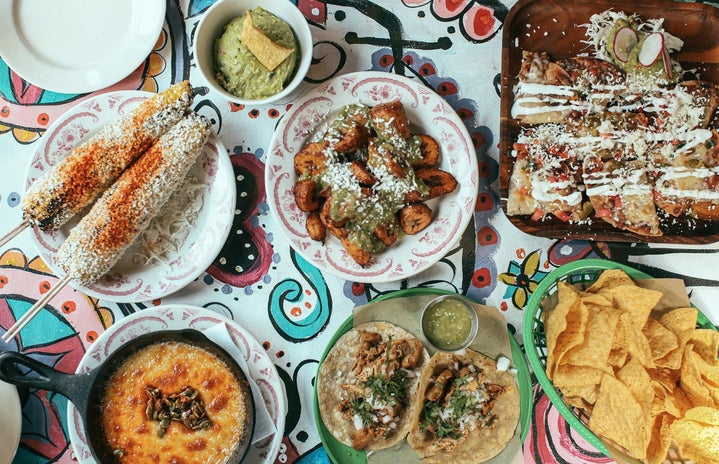With the rise of Korean pop music and drama in the last decade, it comes as no surprise that anything related to Korean culture has been popularized within the past few years. This is no exception when it comes to mukbang (먹방). The original meaning of the term, according to Wikipedia, is an eating show where the host(s) live stream themselves eating large quantities of food and interacting with the audience. In South Korea, many of these hosts use live streams platforms such as AfreecaTV to broadcast their shows. However as mukbangs have gained international fame, many record themselves eating, edit their videos, and thenuploading them onto YouTube to reach out to the wider global audience. In fact many of these recordings can amass more than half a million views. As such it comes as no surprise that many of these hosts or mukbang-ers can earn up to five figure sums. Given that it is such a lucrative career choice, many individuals around the world have started making their own mukbang channels.
While the format of such eating shows have become varied, they still carry the same trait of the e hosts eating copious amounts of food. In many of these videos, the food is either piled up high or spread out on wide surface areas. While some slowly consume an enormous amount of food over a certain period, others continuously (and perhaps with some difficulty) shove food into their mouths. While there are a myriad of reasons why people consume such content – from fascination and astonishment to having a virtual companion when they are eating – over time watching such eating shows can lead to disordered eating and by extension an unhealthy relationship with food.
Disordered eating is an umbrella term that describes irregular eating patterns. It can include binge eating, restrictive eating and a host of destructive eating habits such as taking laxatives, vomiting, starvation and more. Moreover, disordered eating can be an indication of having an eating disorder. The National Cancer Centre Singapore reports that the median age of the onset for anorexia nervosa, bulimia nervosa and binge eating disorder in Singapore is shockingly between 12 to 13 years old; while the median age of onset for restrictive food intake starts as early as 10 years of age. While such numbers are and should be alarming, with access to more resources the same article notes that more youngsters are actively seeking help.
With that being said, the million dollar question is: how does just visually consuming mukbang videos lead to disordered eating? In a BBC clip pertaining to this phenomenon, video blogger Kasper Lee notes that sometimes people watch mukbang to satisfy certain cravings. While she is talking about moments when one is unable to order certain food items such as in the middle of the night when most food stores are closed, there has been an increasing trend in which audiences use such videos to suppress their appetite. This is reflected by the comments left by viewers watching such eating shows. In a research published in Culture, Medicine and Psychiatry, comments such as “He eats I lose weight”, watching such videos “curb my appetite and stop myself digging into a tub of ice cream” and more alarmingly “I haven’t eaten a real meal in 3 days so this is what I ‘eat’” are commonly found. What might have started out as being simply intrigued by such content has led to many using eating shows as a way to starve themselves, usually,to attain that ‘perfect’ figure. This sentiment is mirrored by dietician and Youtuber Abby Sharp, who views such videos as “glorifying eating disorders”. Likening mukbang culture, or at least what it has become, to “food porn”, she notes that such videos are a form of “entertainment, especially to people who are dieting and restricting themselves from delicious foods.”
Additionally she also notes that such videos can trigger binge eating disorder for viewers as they “reinforce a dangerous diet cycle where a binge is often followed by a more restriction which then fuels another binge”. In fact, her own viewers have confided in her stating that such videos can “trigger their disordered eating tendencies and remind them of their own binge and restrict cycle”. In other words such videos can lead to a never ending destructive cycle. More worryingly, as Abby Sharp correctly points out, the glamourization of such eating videos can “normalize and inspire disordered eating in viewers.” This notion of putting disordered eating on a pedestal is clearly reflected in pro-disordered eating sites. In these platforms, members post their daily intake, photographs of their bodies and worse still, shame others and themselves for not sticking to their disordered eating patterns. While such eating videos are not the same as such sites, it can and has unintentionally become a place for such toxicity to fester.
Moreover, it is not just audiences who become affected by watching such eating shows. The hosts themselves are too negatively impacted by overeating in one seating. While some mukbangers like the South Korean Youtuber Banzz, who is currently on a sort of hiatus, supposedly exercises for hours a day to keep fit, there are those like American Youtuber Nikocado Avocado whose overconsumption of food has led to his issues with obesity. Regardless, as Abby Sharp succinctly puts it, “purposefully eating beyond their needs and ignoring their body’s innate hunger and fullness cues […] isn’t normal”. Over time, this puts our body under unnecessary stress as they have to keep up with the constant overconsumption of food.
Audiences have been concerned with the declining physical and mental well-being for these hosts. Using Nikocado Avocado as an example, his Youtube comment sections are filled with comments persuading him to take care of his overall health, amongst some harsher comments who note that they watch him to feel less like a train wreck. However as audiences we cannot help those who are in denial and who do not want to seek help. We can only help those who want to be helped and most importantly, help ourselves. If you are an avid watcher of mukbang videos and feel yourself displaying or glorifying disordered eating, here are some words of advice:
- Stop Watching Mukbangs
The most immediate action you can take is to stop patronizing these videos. Take a break from such videos and by extension social media. In other words, have a social media detox. As Abby Sharp summarizes, “cleanse your accounts of creators who trigger you, or who you think embody an unhealthy relationship with food”. Use that time to focus on yourself and work towards improving your relationship with food and your body.
- Seek Professional Help
There is nothing wrong with asking for help from a professional. Asking for such help when you are aware that you need it is a powerful form of self-care. You are putting yourself first and that is important. Even if you think your relationship with food is not as detrimental as you may think it is, having the support of someone who understands the science behind such topics will aid you in your journey to foster and create a healthy connection with food.


